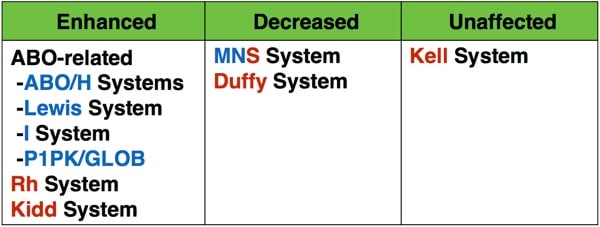Glossary
Enzymes
Obviously, in general, enzymes are proteins that catalyze biochemical reactions. Typically, when blood bankers talk about the “enzyme effect,” we are referring to the effect that proteolytic enzymes (enzymes that help break down proteins) such as ficin and papain have on the expression of blood group antigens on the surface of red blood cells. These enzymes cause the cleavage and degradation of various proteins, and this can have one of three effects on red cell antigens, shown in the image below:

These changes in antigenic strength are detected by changes in the strength of agglutination of the antibodies (e.g., the weakening of Duffy antigens is evidenced by the decrease in agglutination in Duffy antibodies such as anti-Fya or Fyb). Enzymes are used primarily in antibody identification workups, usually as a confirmation of antibody specificity (e.g., weakening reactions after enzyme incubation would support the identification of anti-Fya and would not support identification of anti-D).
Here is one thing that confuses lots of learners, and I want you to keep it straight: Blood bank enzymes modify antigens, not antibodies! We see the impact of the effect through antibody reaction strength changes, but effect is on the antigen.
Back to Glossary List

